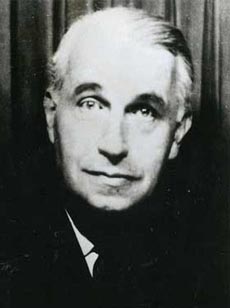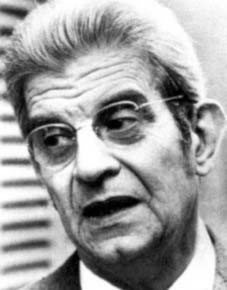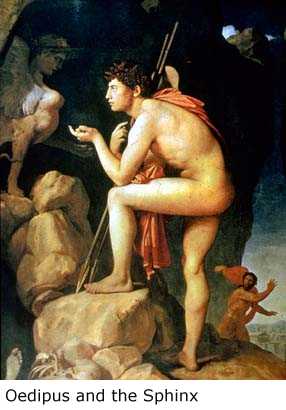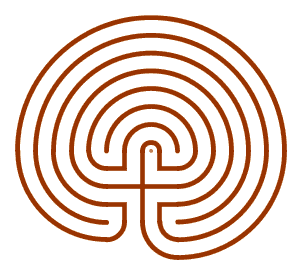6.10.04
The Labyrinth & on Desire and Pleasure: you'll just have to deal with my leakage
13:01 | Posted by
liminal |
Edit Post
I'll do some back-trcking with background and fore-tracking with commentary...but here's a couple paragraphs that struck me today as I was trying to get some work done. Please bear with the vocabulary...it is sensical, just give it a chance. Right now it doesn't matter who wrote these words...I'll unfold this like origami.
--The Culprits--




I. General economy is a traffic system; marking routes within the complex immanence or quasi-horizontality that infests the axis of transcendence. Every vertical difference is collapsible onto a tangled horizontal flow. It is not that base materialism denies the necessity of vertical articulation; there is no tendency to delete the vocabulary of summits and troughs, differences in intensity, materialist thought would leave nothing but a theologically constituted reality abandoned by God (a colony of particles). Scaling is the positive superfluity of God inherent to matter, but its gradations of relative transcendence must be commensurated with an impoersonal nature exhausting the real: genealogically rather than metaphysically explored. The labyrinth is the unconscious of God, or the repressed monotheism. The illusion of ego in general requires that it remain unthought. What God really was is something incompatible with anything 'being' at all. Real composition is not extrinsically created nature, but if this is a Spinozism, it is one in which substance itself is sacrificed to the scales. So that atheism is in the end (an end without an end) an immense sponge, a mega-sponge, the dissolution of boundaries in all of its positive complexity. It is an inexhaustible porosity, drunk upon the sea. Sponge-matter -- encroached without limit bt silence -- is the same thing as fate. In any traffic system real transition precedes articulation (which means that there are no boundaries, but only digressions). Sponge-vectors do not connect pre-existing points, but spawn decomposable patches from out of the subtilization of speeds and the intricate criss-crossing of routes. Absolute points are transcendent mirages, hyperbolically projected out of dismantled vector nets. The reality of space is only the possibility of flow.

sub-I. Freud, too, is an energeticist (although reading Lacan and his semiological ilk one would never suspect it). He does not conceive desire as lack, representation, or intention, but as dissipative energetic flow, inhibited by the damning and channelling apparatus of the secondary process (doman of the reality principle). Pleasure does not correspond to the realization of a goal, it is rather that unpleasure is primary excitation or tension which is relieved by the equilibriating flux of sexual behaviour (there is no goal, only zero); 'unpleasure corresponds to an increase in the quantity of excitation and pleaure to a diminuition' [F III 218]. This compulsion to zero is -- notoriously --ambivalent in Freud's text: 'the mental apparatus endeavors to keep the quantity of excitation present in it as low as possible or at least to keep it constant' [F III 219]. Far from being a discrediting confusion, however, such ambivalence is the exact sympton of rigorous adherence to the reality of desire; epressing the unilateral impact of zero within the order of identitarian representation.
Psychoanalysis, as the science of the unconscious, is born in the determination of that which sufferes repression as the consequence of a transgression against the imperative of survival. It is the pursuit of this repressed threat to the ego which carries Freud along the profound arch of thought from sexuality to the death drive. At first ( in the period up to the First World War) the attempt to explicitly formulate the site of the most irremediable collision between survival and desire leads Freud to his famous reading of the Oedipus myth and the sense os the Father's law, since it is the competition with the Father -- arising as a carrelate of the infant's incestual longing for the mother --- that first brings the relations between desire and survival to a crisis. Later, in the formulation of the death drive, the sacrificial character of desire is thought even more immediately, so that desire is not merely integrated structurally with a threat to existence within the oedipal triangle. but is rather related to death by the intrinsic tendency of its own economy. The intensity of the affect is now thoughtt as inherently oriented to its own extinction, as a differentiation from death or the inorganic that is from its beginning a compulsion to return. But despite recognizing that the conscious self is a modulation of the drives, so that all psychical energy stems from the unconscious (from which ego-energy is borrowed), Freud seems to remain committed to the right of the reality principle, and its representative the ego, and thus to accept a survival (or adaptation) imperative as the principle of therapeutic practice. It is because of this basic prejudice against the cleaims of desire that psychoanalysis has always hasd a tendency to degenerate into a technology of repression that subtilizes, and therefore reinforces, the authority of the ego. In the terms both of the reality principle and the conservative moment of psychoanalysis, desire is a negative pressure working against the conservation of life, a dangerous internal onslaught against the self, tending with inexorable force towards the immolation of the individual and his civilization.
MORE TO COME...stay tuned after these respites of light abundance.
lim

update: a nod to maureen dowd for beating me to the glazing of one of my points regarding (the start of) this thread of eventual discovery. sorry for not being able to get to point sooner... i'll try. too much right now...too much.
--The Culprits--




I. General economy is a traffic system; marking routes within the complex immanence or quasi-horizontality that infests the axis of transcendence. Every vertical difference is collapsible onto a tangled horizontal flow. It is not that base materialism denies the necessity of vertical articulation; there is no tendency to delete the vocabulary of summits and troughs, differences in intensity, materialist thought would leave nothing but a theologically constituted reality abandoned by God (a colony of particles). Scaling is the positive superfluity of God inherent to matter, but its gradations of relative transcendence must be commensurated with an impoersonal nature exhausting the real: genealogically rather than metaphysically explored. The labyrinth is the unconscious of God, or the repressed monotheism. The illusion of ego in general requires that it remain unthought. What God really was is something incompatible with anything 'being' at all. Real composition is not extrinsically created nature, but if this is a Spinozism, it is one in which substance itself is sacrificed to the scales. So that atheism is in the end (an end without an end) an immense sponge, a mega-sponge, the dissolution of boundaries in all of its positive complexity. It is an inexhaustible porosity, drunk upon the sea. Sponge-matter -- encroached without limit bt silence -- is the same thing as fate. In any traffic system real transition precedes articulation (which means that there are no boundaries, but only digressions). Sponge-vectors do not connect pre-existing points, but spawn decomposable patches from out of the subtilization of speeds and the intricate criss-crossing of routes. Absolute points are transcendent mirages, hyperbolically projected out of dismantled vector nets. The reality of space is only the possibility of flow.

sub-I. Freud, too, is an energeticist (although reading Lacan and his semiological ilk one would never suspect it). He does not conceive desire as lack, representation, or intention, but as dissipative energetic flow, inhibited by the damning and channelling apparatus of the secondary process (doman of the reality principle). Pleasure does not correspond to the realization of a goal, it is rather that unpleasure is primary excitation or tension which is relieved by the equilibriating flux of sexual behaviour (there is no goal, only zero); 'unpleasure corresponds to an increase in the quantity of excitation and pleaure to a diminuition' [F III 218]. This compulsion to zero is -- notoriously --ambivalent in Freud's text: 'the mental apparatus endeavors to keep the quantity of excitation present in it as low as possible or at least to keep it constant' [F III 219]. Far from being a discrediting confusion, however, such ambivalence is the exact sympton of rigorous adherence to the reality of desire; epressing the unilateral impact of zero within the order of identitarian representation.
Psychoanalysis, as the science of the unconscious, is born in the determination of that which sufferes repression as the consequence of a transgression against the imperative of survival. It is the pursuit of this repressed threat to the ego which carries Freud along the profound arch of thought from sexuality to the death drive. At first ( in the period up to the First World War) the attempt to explicitly formulate the site of the most irremediable collision between survival and desire leads Freud to his famous reading of the Oedipus myth and the sense os the Father's law, since it is the competition with the Father -- arising as a carrelate of the infant's incestual longing for the mother --- that first brings the relations between desire and survival to a crisis. Later, in the formulation of the death drive, the sacrificial character of desire is thought even more immediately, so that desire is not merely integrated structurally with a threat to existence within the oedipal triangle. but is rather related to death by the intrinsic tendency of its own economy. The intensity of the affect is now thoughtt as inherently oriented to its own extinction, as a differentiation from death or the inorganic that is from its beginning a compulsion to return. But despite recognizing that the conscious self is a modulation of the drives, so that all psychical energy stems from the unconscious (from which ego-energy is borrowed), Freud seems to remain committed to the right of the reality principle, and its representative the ego, and thus to accept a survival (or adaptation) imperative as the principle of therapeutic practice. It is because of this basic prejudice against the cleaims of desire that psychoanalysis has always hasd a tendency to degenerate into a technology of repression that subtilizes, and therefore reinforces, the authority of the ego. In the terms both of the reality principle and the conservative moment of psychoanalysis, desire is a negative pressure working against the conservation of life, a dangerous internal onslaught against the self, tending with inexorable force towards the immolation of the individual and his civilization.
MORE TO COME...stay tuned after these respites of light abundance.
lim

update: a nod to maureen dowd for beating me to the glazing of one of my points regarding (the start of) this thread of eventual discovery. sorry for not being able to get to point sooner... i'll try. too much right now...too much.
Blog Archive
-
▼
2004
(398)
-
▼
October
(74)
- When Stephen Hawking steps up and speaks out again...
- Angry, I AM
- Change American Democracy With a Few Quick Phone C...
- Pentagon suppresses details of civilian casualties...
- The Battle of Algiers
- A Brave New America
- Accountability
- The road to Abu Ghraib
- 100,000
- Video Shows G.I.'s at Weapon Cache
- Endorsement: John Kerry for President
- Palast challanges "the man"
- The 58,000 Ballots Show Up and Deliver the Preside...
- Victory Finger
- What is up with Abizaid and Nader?
- KOh'NEEE CHEE'WAH...WahTAHK SHEE'WAH DEHSS lim.
- Ghandi Rocks
- Dick Cheney Sucks
- Perhaps an Iraqi solves *some of the cognitive dis...
- Eminem's Sick Video of "Mosh"
- Iraqi Expatriate Voices
- The Iraqi Triumvirate: Zeyad + Riverbend + Salam
- Hm. I wonder why all those people are dying in al...
- Trick-or-treating outlawed in Baghdad, Washington....
- The Department of WTF
- American Ignorance Rampant
- Bush would Accept Islamic Iraq, Bush fundamentaliz...
- Dare I forget to mention Jon Stewart?
- google saved a life, this is the pervasiveness of ...
- optimism still possible through seeing the right r...
- Yet another mindless kidnapping of an Aid worker
- 5 years - life
- Salam Pax's Documentaries
- The Consequences of War: Eastside
- Feeling a draft II
- I've got a new word for ya
- The Consequences of War: Westside
- The Numbers
- Existential Tenacity Induces Paranoiac Mindstates
- Abu Ghraib and Iraqi Prisons
- (T)error - game and reality / Terror - reality no ...
- Ramahdan Mubarak
- some unfortunate events have come to pass. i will...
- Important Iraqi Voice Alert X 2: Zeyad & River
- Preservation of Privelege
- Future generations will struggle to escape the leg...
- "What a wonderful world..." war
- Notizie Exchange Analysis
- Jacques, say it ain't so.
- Suddenly, I thought I was in Beirut
- He was hiding in his spider hole, I mean grave, a ...
- AH-hem [clear my throat], lek ya boosh...you lose
- The Giant speaks through the poet.
- Naomi on Sadr
- un-UN'ed or un-UN'endO
- Delay go A-WAY
- Some more valid questions.
- A valid question.
- The Oedipal bipedal
- The Labyrinth & on Desire and Pleasure: you'll jus...
- The Department of WTF
- "It's hard work..."
- Nuclear War in the form of Depleted Uranium: The ...
- If Al-Zarqawi even exists...
- How convenient!
- I am losing it because of Baghdad and Samarra now,...
- Taking a break, losing my marbles...
- echoBloggin the times and some horrific pics
- The Taguba Report and related materials
- The Great War in Color
- Iraqi Artists II: Repost with Additions
- Seymour Hersh: Interview with Jon Stewart, the Neo...
- On my desktop now
- The Debate
-
▼
October
(74)
Iraqi Culture
Sites
- Korea Life Blog
- Toothing
- Academic Secret
- African Food Blog
- Genius Duck
- Blogopoly
- Second String Swap
- Work at Home News
- Bashhh
- Just Another Opinion Blog
- Hairstyles and Nails
- Chiefly Musing Home Tips
- Health Talk and You
- Awryt
- Zacquisha
- Hairstyles and Nails
- Health Talk and You
- link
- Saints Car Club
- Moon Rider
- Super Pong
- Jeffrey Scott Band
- Fusion Recipes
- Oregon Lawyers
- Rent Empress
- Jake Gyllenhaal Fan Club
- Hurdler Page
- link
- Johnny Bravo Site
- link
- Survey Land
- Internet Data
- link
- Film Acting
- Golden Girls Quotes
- link
- Soda Traders
- The Chess Haven
- Integrity Library
- A&F Models
- Dancer's Domain
- Myanmar Institute of Technology
- link
- Pilgrim's Products
- Redhead Hair Site
- Olympics Page
0 comments:
Post a Comment